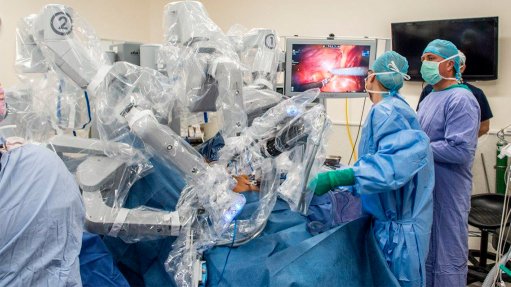
As the field of robotics advances, South Africans are increasingly opting for robotics surgery for prostate cancer as an alternative to conventional procedures.
Urological and robotics surgeon Dr Greg Boustead says medical schemes are beginning to appreciate the long-term, overall benefits of the robotic approach.
State-of-the-art equipment and cameras are used in robotic surgery for prostate cancer, which is the most commonly diagnosed cancer and the second most common cause of death in men in South Africa, next to lung cancer.
Boustead, who is a pioneer of robotics surgery in South Africa, initiated the first robotics programme for prostate cancer cases in South Africa in 2013. Since then, over 2 500 robotic prostatectomy operations have been carried out.
Boustead finds both the process and recovery rate of patients very rewarding.
“People who have never been exposed to robotics tend to be sceptical. But when they look down that console, they are completely blown away. What you can actually see with three-dimensional high-definition cameras and how this translates into how well a patient does in terms of functional recovery, is incredible.”
In a robotic prostate cancer operation, the surgeon sits at a control panel in the operating room and moves robotic arms to operate through several small incisions in the patient’s abdomen.
Boustead says despite advances in robotic surgery, which offer health and economic benefits down the line, some medical aid schemes still need to be convinced that it is worthwhile to fund. The cost for robotics surgery is higher than for open surgery.
“Currently it’s around R155 000 for a robotic prostate cancer surgery using the Da Vinci system. But in the long run, it can be far more cost-effective than open surgery, keyhole surgery and radiation, which can become very expensive with repeat treatments.”
Boustead says data from the over 2 500 patients who have undergone robotic surgery procedures in South Africa has shown that patients tend to spend less time in hospital and recover more quickly. There’s also a reduced risk of bleeding and complications and reduced need for blood transfusions.
Boustead adds that patients also show better outcomes in terms of cancer control, incontinence and sexual function.
“Most patients get rid of their catheters far more quickly and go back to work and their normal lifestyle and exercise soon after surgery.”
Boustead says, ideally, he would like to see more scale in robotics to make procedures more cost efficient.
“We’d like to see more high-volume centres with well-trained teams. This would also be a financial win for everyone.”
Boustead, who has trained 22 out of the 27 robotics prostate cancer surgeons in South Africa, says training on the US-developed Da Vinci technology is intense and very strict. Surgeons have to do online courses and modules to learn about the technology and then complete another 30 to 40 hours on a simulator, which is akin to a flight simulator.
“The main thing is safety. If you have one instrument outside the field of vision, you are penalised. Anything outside of the field of vision could be harmful to the patient.”
He says learning to become a robotics surgeon is an immersive experience.
“On the console, you can move the camera in and out and you can rotate it. You imagine that your robotic instruments are your own hands. It almost becomes a natural thing.”
Advances in robotics have been sweeping, with surgeons even able to operate remotely. Technology has also enabled more flexibility.
“Traditionally, a patient would be placed on a fixed operating table. With robotic surgery, advances we now have integrated operating tables working in sync with the robot and tilting in different directions. If the surgeon is working on the pelvis, but then wants to work on the colon, they can tilt the table and the robot will just adapt.”
Boustead is also chairperson of the Prostate Cancer Foundation in the Western Cape. He advocates for screening and access to early diagnosis for prostate cancer. He believes greater education and awareness of prostate cancer and men’s health issues is essential.